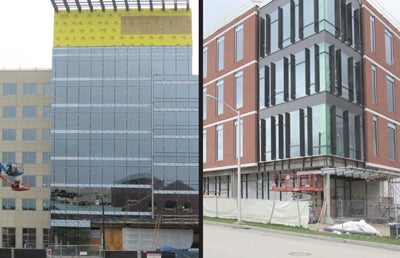Checking Worcester's Business Climate
 PHOTOS/RICK SAIA
Images of Worcester's future, from left: the future downtown home of Unum, and new construction of Gateway Park.
PHOTOS/RICK SAIA
Images of Worcester's future, from left: the future downtown home of Unum, and new construction of Gateway Park.
It's not just in geography that the city of Worcester is the center of Central Massachusetts. Almost a third of workers in Worcester County are employed in the city. Major organizations headquartered in Worcester, such as UMass Memorial Health Care and Reliant Medical Group, have satellite offices throughout the region. Stores in the suburbs have customers who drive out from the city, and manufacturers have suppliers there.
So the economic health of Worcester matters to just about everyone in Central Massachusetts. And for years, everyone has had reason to be worried. As in many Northeastern cities, the manufacturing base of the city's economy has shrunk, even as it has increased its efficiency and specialized in high-tech niches. Plenty of dark spots remain when it comes to taxes, city services and a lingering economic malaise, yet the city has responded to its ongoing challenges by building vibrant health care and technology sectors and courting new development.
These four mini-stories reflect the state of Worcester's business climate today: the position of the life sciences and health care industries, the tough balance between giving tax breaks to key businesses and keeping taxes fair for all, the quality of life for workers in the city and the amount of regulatory red tape companies deal with at City Hall.
Life Sciences and Health Care
In conversations with business leaders about what's going right in Worcester, the most common topic might be the Massachusetts College of Pharmacy and Health Sciences. Roberta Schaefer, president and CEO of The Worcester Regional Research Bureau, said the college's decision to take over the former Crowne Plaza Hotel property downtown was a great development for the city.
"They put up a building in no time flat, just squeezed it in on a part of that property where there was a pool," she said. "That was just amazing that we didn't end up with another white elephant."
The college is based in Boston but has been growing in Worcester since it opened a campus in the city in 2000, and college President Charles Monahan said it's not done yet. It will officially open a new optometry school this summer, and Monahan said it plans to turn more downtown space into parking areas and new buildings as it adds programs.
Monahan said the biggest reason for opening in Worcester to begin with was the college's need for clinical affiliations. Having Saint Vincent Hospital and UMass Memorial Medical Center close by, along with major health clinics and a wealth of biotech companies, made the city an obvious place to go, and continues to make it a good place to expand, he said.
City officials have long had a deliberate focus on health care. Back in 1992, Worcester took on a seriously contaminated former industrial site, and, with the help of eminent domain laws and state cleanup funds, made room for the current Saint Vincent building.
The city has also consciously courted biotechnology businesses, beginning as far back as the 1980s, with the creation of the Massachusetts Biotechnology Research Park near UMass Medical Center.
"They have been very receptive to the life sciences and health care industry," said Kevin O'Sullivan, president and CEO of the Massachusetts Biomedical Initiatives (MBI).
One of the most recent examples of that receptivity is the city's support for Blue Sky BioServices, a company that grew from two founders to 40 staff members at the MBI's incubator facility, and is now expanding at a new headquarters in the city. Founder Paul Wengender wrote in an email that the most important factors the company considered in selecting its new home were a biotech-grade facility for its labs, access to a top talent pool and proximity to clients and fellow biotech players.
Taxes And Tax Breaks
Another celebrated success in the city these days is the long-anticipated forward movement at CitySquare. Over the past few years, the city convinced Unum to relocate its Worcester offices to the former downtown Galleria Mall site, then got Saint Vincent to commit to putting its new cancer center there. Like most major development deals, these two involved tax increment finance (TIF) agreements — worth $13 million for Unum and $9.8 million for the hospital.
While most in the Worcester business community cheer whenever a large company moves to the city or decides to stay rather than move to a suburban site, some say TIFs shift the tax burden onto smaller businesses. And that's on top of a dual property tax rate that already makes commercial and industrial landowners pay significantly more in the city than they would elsewhere.
This issue was highlighted just this month when the city revisited its assessment of commercial property values and significantly upped the assessed value of a majority of commercial and industrial buildings.
"It hurts," said Fran Madigan, president of Worcester construction company FW Madigan Co Inc. "It's very much of a detriment. The tax bill is very high."
Madigan said he understands the reasons for TIFs and other incentives, but he also worries about his fellow small-business owners.
"Government officials have to realize who the major players in the business world are, and they have to certainly keep them happy, but they have to keep the core people happy," he said. "I still pay my full taxes."
High taxes are a big issue among biotech startups, according to O'Sullivan, since they often have both precarious budgets and a lot of expensive equipment that's subject to the city's personal property tax. In fiscal 2011, Worcester collected $14.7 million in personal property taxes, just under 7 percent of its total tax levy.
Schaefer said that, in an ideal world, the city shouldn't pick favorites by giving tax breaks to specific companies and should instead keep taxes as low as possible for everyone.
"It skews the market," she said.
She said TIFs were originally intended to help less prosperous communities, like Worcester, pull in economic drivers, but the state now allows any city or town to offer them. That means there's a bidding war whenever a major company plans a new location.
"Now it becomes a tax break for Wellesley too, which doesn't make sense," she said. "They don't need TIFs."
Schaefer said the research bureau would also like to end dual tax rates in the state. She said they've been adopted by the cities and towns that need the cash the most, but they're also the communities that can least afford to scare away businesses.
City Services And Culture
The flip side of taxes, of course, is the services a city provides. If no business wants to pay high taxes, almost all of them see value in good public schools, roads and public safety services. Along with cultural resources, these are some of the things that define the quality of life a company's employees can find in the city.
Madigan said city services are important to his construction business.
"My employees have to drive on city roads," he said.
He thinks the city is doing pretty well with what it has for finances, but, like most businesses, it's stretching to do everything it needs with a limited budget.
Richard Kennedy, president of the Worcester Regional Chamber of Commerce, said schools are a key issue for the city.
"As a mid-size city, it's probably one of the biggest challenges anyone faces," he said. "Accommodating various ethnic groups, diverse groups that are part of the city these days—clearly it's a challenge."
Kennedy thinks the Worcester Education Collaborative, an independent organization funded by some of the area's largest employers, has done a good job exploring ways to improve education in the city.
Still, there's no doubt many people who work in the city are put off by test scores and other measurements that look better in smaller communities outside Worcester. O'Sullivan said most employees at local biotech firms don't live in the city, but the fact that they can find highly rated school systems in nearby suburbs still makes the area attractive.
Another aspect that can make a city attractive to employees is the cultural amenities that are available, and that's another area Worcester officials have pushed in recent years.
Kennedy said he often hears people say there's not much to do in the city, and he responds by asking them when they last visited the Worcester Art Museum, the city's parks or the relatively new Hanover Theatre.
"They haven't been in 20 years," he said. "Take a look and enjoy what it is we have to offer here."
While the downtown area isn't particularly busy, Kennedy said, there are other activity centers like Shrewsbury Street and the Canal District, a pattern not much different from major urban centers.
"How much activity do you actually see around Boston City Hall?" Kennedy said. "You see it in the North End, Newbury Street."
Mark Waxler, general manager of the Beechwood Hotel, said the Hanover and the DCU Center help drive the local economy.
"It shows that the people in Worcester support the different attractions," he said.
Permits And Regulations
Aside from paying taxes, one of the most obvious ways local government enters the lives of businesses is through regulations. Developers must seek an array of local permits to build, and other businesses need to deal with licensing requirements and other sorts of red tape.
For the most part, local businesses give the city good marks for helping them navigate the regulations.
"I think the tougher the business climate, the more that city officials go out of their way to cooperate and assist, not only real estate developers and investors, but all businesses," said Philip Shwachman, president and CEO of First American Realty.
Schwachman thinks the city is especially solicitous of big businesses, but it's reasonably helpful to small ones too. He said he's particularly impressed with the new automated building permit application process, which lets developers fill out applications online.
Kennedy said the city helps guide businesses through the necessary processes, but he'd like to see things streamlined a bit more, particularly for very small companies.
"Smaller businesspeople aren't used to the processes they have to do," he said.
At the Beechwood, Waxler said city officials, including City Manager Michael O'Brien, Chief Development Officer Tim McGourthy and Public Works and Parks Commissioner Robert Moylan, have been very supportive of local business.
"When we did our renovations here a few years ago [they] helped us through licenses and approvals to make our life much easier," he said.
Schaefer said officials can go a long way toward improving a city's business climate simply through the way they talk.
"It's the leadership, the whole image that you project," she said. "And my sense is that Mike O'Brien has done a good job of that, of projecting an image of, 'We're open for business.' He's out there. He's a real booster."








0 Comments